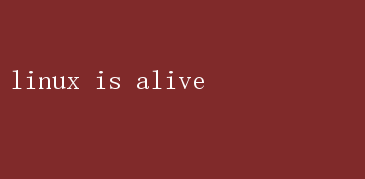Linux生机盎然:探索其不灭魅力
linux is alive
作者:IIS7AI 时间:2024-12-31 07:37

Linux is Alive: The Evergreen OS That Shapes Our Digital World In the vast landscape of operating systems, one name stands out not just for its enduring presence but for its vibrant, ever-evolving spirit: Linux. To declare that Linux is alive is not merely a statement of fact but a testament to its unparalleled resilience, innovation, and impact on the digital frontier. From its humble beginnings as a passion project by Linus Torvalds in 1991 to its current status as a cornerstone of modern computing, Linux has transformed from a niche enthusiasts toy into a powerful, ubiquitous force shaping our technological landscape. The Genesis of an Icon The story of Linux begins with a simple request on a Usenet forum. Torvalds, a student at the University of Helsinki, sought a Unix-like operating system that could run on his Intel-based personal computer. Dissatisfied with the existing options, he decided to create one himself. This modest beginning sparked a revolution that would redefine the way we think about open-source software and collaborative development. Torvalds vision was clear: to create a free, open-source operating system that anyone could use, modify, and distribute without restrictions. This philosophy, rooted in the principles of freedom and collaboration, resonated with a global community of developers, hobbyists, and tech enthusiasts. Overnight, what started as a solo endeavor became a collaborative masterpiece, with contributions pouring in from around the world. The Heartbeat of Open Source One of the most compelling aspects of Linuxs alive status is its open-source nature. Unlike proprietary operating systems, Linuxs codebase is freely accessible to anyone. This transparency fosters a culture of trust, as users can inspect and verify the softwares integrity. Moreover, it encourages innovation and rapid iteration; features and improvements are often implemented and distributed in real-time, driven by a community-driven development model. The GNU/Linux ecosystem, as it is often referred to, encompasses a vast array ofdistributions (or dists for short), each tailored to meet specific needs. From Ubuntus user-friendly interface designed for mainstream adoption to Debians stability and Fedoras cutting-edge features, the diversity of Linux distros reflects its versatility and adaptability. This rich tapestry of choices allows users to find the perfect fit for their workflows, whether they are gamers, developers, scientists, or simply everyday computer users. The Power Behind the Curtain Linuxs influence extends far beyond the desktop. It is the backbone of the internet, powering servers that host websites, manage databases, and facilitate communication across the globe. Major tech companies like Google, Amazon, Facebook, and Netflix rely heavily on Linux for their backend infrastructure. Its robust security, scalability, and efficiency make it the ideal choice for handling massive data loads and maintaining uptime in high-demand environments. In the realm of cloud computing, Linux is equally indispensable. Platforms like AWS, Microsoft Azure, and Google Cloud all offer Linux-based virtual machines and services, enabling businesses to deploy and scale applications with ease. This widespread adoption underscores Linuxs role as a key enabler of digital transformation, driving innovation and efficiency across industries. The Developers Paradise For developers, Linux is a paradise of tools and resources. Its powerful command-line interface, extensive documentation, and vibrant package management systems provide a fertile ground for learning and creativity. Programming languages, frameworks, and development tools thrive in this ecosystem, often with native support or deep integration. Linuxs role in the open-source movement has also led to the creation of countless projects that have shaped the modern tech landscape. Git, the de facto standard for version control, was developed under Linux. The same goes for Docker, which revolutionized containerization, and Kubernetes, the go-to platform for managing containerized applications. These innovations, and many others like them, have emerged from the collaborative spirit that Linux embodies. Security and Privacy: A Stronghold in a Vulnerable World In an era where cyber threats are
- 上一篇:伙伴云:手机电脑无缝连接指南
- 下一篇:一键删除电脑云文档,轻松整理云空间